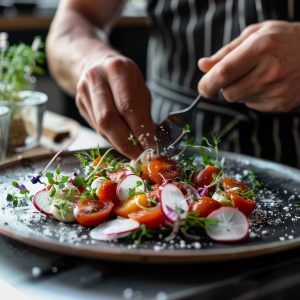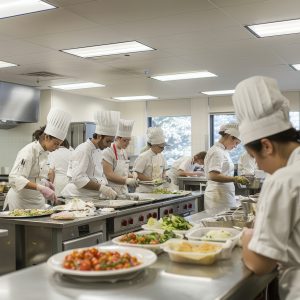Should I Consider Going To Culinary School Abroad?
Embarking on a culinary journey abroad is an experience like no other, blending the art of cooking with the excitement of discovering new cultures. Studying culinary arts in a foreign country offers a unique and enlightening perspective on global cuisine, immersing you in regional flavors and techniques that go beyond the typical classroom setting.
Whether it’s mastering the art of French pastries in Paris, learning the secrets of sushi in Tokyo, or perfecting Italian pasta in Rome, each destination provides an opportunity to refine your skills under the guidance of world-renowned chefs. Additionally, the chance to explore local markets, taste authentic dishes and understand the culinary traditions of different cultures enriches your cooking repertoire and broadens your palate.
This adventure enhances your culinary expertise and fosters personal growth, independence, and adaptability. As you navigate through this exciting chapter, you’ll gain invaluable experiences that shape your culinary style and open doors to a world of opportunities in the food industry. So, if you’re ready to spice up your career and add a global touch to your culinary skills, studying abroad could be the perfect ingredient for your success.
Advantages of Going Abroad for Culinary School
Going abroad for culinary school offers numerous advantages that can significantly enhance your culinary education and career. Here are some key benefits:
- Exposure to Diverse Cuisines: Studying in a different country allows you to learn from local chefs and experience authentic regional dishes, broadening your culinary skills and knowledge.
- Cultural Immersion: Living and learning in a new country immerse you in its food culture, helping you understand the traditions, ingredients, and techniques that define its cuisine.
- Networking Opportunities: International culinary schools often connect with renowned restaurants and chefs. Building relationships abroad can open doors to internships, job placements, and collaborations.
- Enhanced Creativity: Exposure to different culinary styles and ingredients can inspire creativity and innovation in your cooking, leading to a more unique and diverse culinary perspective.
- Language Skills: Studying in a country where a different language is spoken can improve your language skills and benefit international culinary environments.
- Personal Growth: Navigating a new country challenges you to adapt and develop independence, resilience, and problem-solving skills, which are valuable in both personal and professional life.
- Global Recognition: Degrees and certifications from prestigious international culinary schools can enhance your resume and make you more competitive in the global job market.
Disadvantages
While studying culinary arts abroad offers many benefits, there are also some potential disadvantages to consider:
- Cost: International culinary programs can be expensive, with high tuition fees, travel expenses, and living costs. Financial aid and scholarships may be limited, making it a significant financial investment.
- Cultural and Language Barriers: Adapting to a new culture and learning a new language can be challenging and may initially impact your ability to engage with the program entirely.
- Homesickness: Being away from family and friends for an extended period can be emotionally challenging, and the distance may be difficult to manage, especially during significant life events or holidays.
- Visa and Legal Issues: Securing the appropriate student visa and navigating immigration regulations can be complex and time-consuming, adding extra stress.
- Quality and Relevance of Education: Not all international culinary programs have the same standards or align with your career goals. Researching and ensuring that the program is reputable and offers the specific training you seek is essential.
- Adjustment to Different Educational Systems: Countries may have varying educational standards and practices, which can require adjustment and adaptation.
- Limited Support Networks: Living in a new country might mean having fewer support systems, which can affect your overall experience and academic performance.
Considering these factors and weighing them against the advantages can help you make a more informed decision about studying culinary arts abroad.
How Do You Find the Right School?
Finding the right culinary school abroad involves several vital steps to ensure the program aligns with your career goals, interests, and needs. Here’s a guide to help you make an informed decision:
- Identify Your Goals:
- Specialization: Determine what area of culinary arts you want to focus on, such as pastry, international cuisine, or restaurant management.
- Career Aspirations: Consider whether you want a program that offers strong industry connections or specific training that aligns with your career goals.
- Research Schools:
- Accreditation and Reputation: Look for schools with good reputations and proper accreditation. Check reviews and rankings to gauge the quality of the education.
- Curriculum: Review the course offerings and curriculum to ensure they match your interests and career objectives.
- Check Faculty Credentials:
- Expertise: Research the instructors’ qualifications and experience. Renowned chefs and industry professionals can provide valuable insights and connections.
- Consider Location:
- Cultural Fit: Choose a location that aligns with your interests and comfort level. Consider language barriers, cultural differences, and lifestyle.
- Evaluate Facilities and Resources:
- Facilities: Ensure the school has modern kitchen facilities, equipment, and resources to enhance your learning experience.
- Support Services: Check for additional support, such as career counseling, internships, and language assistance.
- Review Costs and Financial Aid:
- Tuition and Fees: Compare the cost of programs and consider what fits within your budget.
- Scholarships and Grants: Look for available scholarships or financial aid options to help manage expenses.
- Visit and Network:
- Campus Visits: Visit the schools to get a feel for the environment and facilities.
- Speak with Alumni: Connect with former students to gain insights into their experiences and outcomes.
- Application Process:
- Deadlines: Be aware of application deadlines and required documents.
- Requirements: If applicable, ensure you meet the admission requirements, including language proficiency.
By following these steps and thoroughly researching your options, you can find a culinary school abroad that best fits your needs and helps you achieve your culinary career goals.
What If You Don’t Speak the Native Language?
If you don’t speak the native language of the country where you’re studying culinary arts, it can present several challenges, but there are ways to manage and overcome them:
- Language Courses: Many culinary schools offer language courses or support services to help international students improve their language skills. These classes can help you communicate more effectively in and out of the kitchen.
- Language Support: Look for schools that provide language assistance or translation services. Some institutions may have staff or resources dedicated to helping non-native speakers navigate their studies.
- Language Apps and Tools: Use language learning apps like Duolingo, Babbel, or Rosetta Stone to build language skills. Translation apps can also help you with daily communication and understanding instructional materials.
- Study in English-Speaking Programs: Some culinary schools abroad offer programs in English. This allows you to learn in an international environment while bypassing language barriers.
- Immerse Yourself: Practice the local language as much as possible through interactions with locals, participating in cultural activities, and engaging in social settings. This immersion can accelerate your learning process.
- Seek Support: Connect with fellow international students or local friends who can help you navigate language difficulties and provide support.
- Focus on Universal Aspects: Culinary skills often involve universal techniques and terminology. Emphasize learning the culinary vocabulary and techniques that are common across languages.
Overcoming language barriers requires effort and adaptability but can also lead to personal growth and enhanced communication skills.














